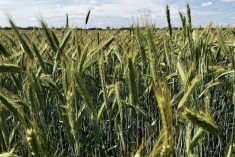Most grain crops in the European Union have continued to benefit from favourable weather in the past month, although a lack of hardiness could leave some plants vulnerable to frost, the EU’s crop monitoring service MARS said Dec. 14.
The buildup of frost tolerance has been generally weak in central, eastern and southeastern Europe, MARS said, stressing the risk could be greater along the Black Sea where crop development has been delayed by late sowing.
Sowing of winter grains was virtually complete in most of Europe by early November but continued for several more weeks in Romania, Bulgaria and also in non-EU neighbour Ukraine, MARS said in a monthly report.
Read Also

GATE project nears 50 per cent of fundraising goal
Farmers at the SaskWheat annual meeting hear GATE raises $42.65 million, but questions continue over cost of Cereals Canada project.
The crop monitor said last month that sowing and crop emergence had been delayed in parts of central and southeast Europe due to dry weather.
However, its simulations suggested that no frost had occurred so far in the EU, it added.
In northern and central Europe, above-average temperatures and near-seasonal precipitation in November were favourable for crop emergence and early development, MARS said.
In western Europe and particularly in top EU grain producer France, below-average temperatures since early October hampered early growth of winter wheat, with only a few fields reaching the tillering stage, the crop monitor said.
Crop conditions are being closely watched after concerns about reduced global supplies led to record wheat and rapeseed prices in Europe in recent weeks.















